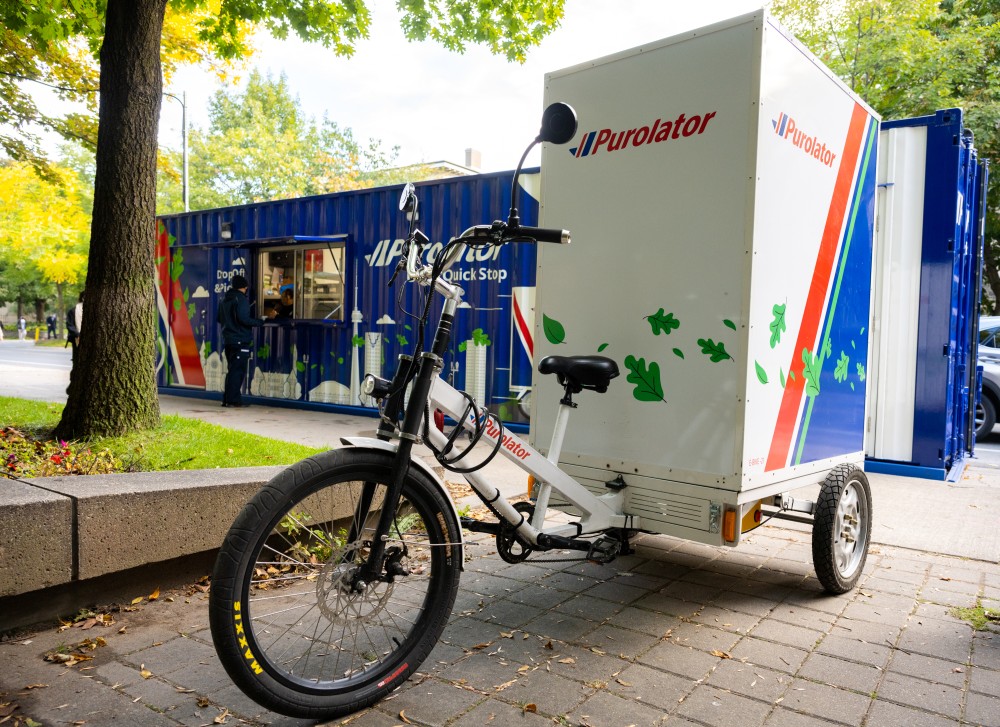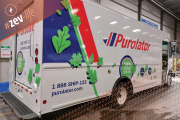Purolator’s brightly coloured "Mini-Hub," located on St. George Street on the University of Toronto’s downtown campus, is a busy operation. Wrapped in Purolator’s branding, the 40-foot re-purposed shipping container serves as a central distribution centre for last-mile parcel deliveries, a store front where packages can be dropped off and picked up, and a storage facility for Purolator bikes.
But not just any bikes. The Mini-Hub is where a fleet of electric cargo bikes are parked and charged overnight. The On-Street Logistics Mini-Hub is the second of two Purolator-run Mini-Hubs, the first having been installed in a nearby public parking lot a couple months prior, in July 2022. The cargo bikes have replaced Purolator trucks used to deliver goods throughout the surrounding area.
Purolator, as well as two other courier companies (FedEx and NrBi), partnered with the City of Toronto to test the feasibility of providing last-mile deliveries —
The Mini-Hub pilot was to run for 18 months at the end of which the City and the courier company would assess the results, taking into consideration factors such as number of packages delivered, operational efficiencies, emissions reductions and the alleviation of traffic congestion.
When the time came to tally up the metrics, everyone came away happy. Says Doolin O’Reilly, senior project manager with the City’s Transportation Department and enthusiastic proponent of the cargo bike initiative, “The results exceeded expectations.”
This spring, transportation staff with the City submitted a request to council to make the St. George Street Mini-Hub permanent and to allow other courier companies to open similar hubs.
The transportation team presented a strong case. Working with the Pembina Institute, monthly surveys had been sent to Purolator supervisors and cargo bike operators over the course of the pilot project. Responses were overwhelmingly positive. Couriers expressed a high degree of satisfaction with using e-bikes for deliveries, and supervisors reported that there had been no decline in delivery volumes.
Says Sarah McBain, senior analyst with the Pembina Institute, “We weren’t sure what the outcomes would be when Purolator started using their cargo bike fleet, but what we’ve seen looks very promising. The people using the bikes to make deliveries told us that the speed and efficiency of their trips have improved. Bike riders don’t need to circle a block over and over to find a place to park nor do they get stuck in traffic. Needless to say, it’s a much cleaner and quieter ride for the drivers.”
Ontario embraces micro-mobility
The government of Ontario announced its electric cargo bike pilot project in March 2021, and issued a request for applications from the province’s urban centres. The City of Toronto was quick to respond. Alongside Ottawa, Hamilton and London, Toronto’s city council submitted a proposal where residents and businesses would be allowed to operate electric cargo bikes on city streets.
At the time, council permitted electric cargo bikes weighing less than 120 kg unladen to operate in the city. But the Transportation Department noted that courier companies face a variety of challenges when navigating the urban core: traffic snarls and longer delivery times, soaring operating costs, and rising greenhouse gas emissions. Addressing these concerns would require a new approach to the movement of goods and services. So, in December 2021, council expanded the allowance to include the use of larger electric cargo bikes —
Doolin O’Reilly says that once the City greenlighted the use of heavier cargo bikes, the transportation team made inquiries to see which courier companies were interested in incorporating these new micro-mobility vehicles in their delivery model. FedEx, Purolator and NrBi all signed on.
The big reveal
In addition to the surveys sent out during the pilot, a research group from the University of Toronto initiated a comparative study to determine the impact of replacing three of Purolator’s freight trucks with three cargo e-bikes operating out of the Mini-Hub on St. George Street. At the end of the 18-month trial period, the results were in:
- A single cargo e-bike using the Mini-Hub can replace one delivery van/truck for a given delivery area without compromising the delivery efficiency.
- Replacing a single delivery truck with one cargo e-bike eliminated 3.1 to 5.5 metric tonnes of greenhouse gas emissions annually and reduced NOx (significant components of air pollution) by approximately 7.8 to 9.8 kg annually.
- On average, a delivery truck's stopping frequency was 24 stops per day while that of the cargo e-bike was 37 stops per day; parking duration of cargo e-bikes was about 65% shorter than a delivery truck.
- Operators riding the delivery cargo e-bikes were likely exposed to lower concentrations of air pollutants than operators driving the delivery trucks, due to the buildup of particulates in delivery vehicle cabins.
Signs of success
The City of Toronto is eager to see more Mini-Hubs in central locations and noted that the program's success was largely unaffected by variable weather conditions.
Additional findings from the University of Toronto research group show that:
- Purolator’s Mini-Hub on St. George Street processed more than 4,800 packages for customers in 2023, or more than 20 packages a day over their 240 operating days.
- The three Purolator cargo e-bikes that operate out of the St. George Mini-Hub are delivering nearly 400 individual packages per day. In 2023, the cargo e-bikes made 55,000 deliveries in the designated delivery zones totaling 93,000 packages.
Doolin says that the most rewarding aspect of the pilot is that it’s a win-win for the City and the courier company. “For the City, the focuses are road safety and environmental improvements, as well as reducing traffic on our congested road network. As a commercial enterprise, Purolator has to consider the efficiency of their delivery operations.
“This pilot has fostered positive relations between the municipality and the courier industry. It’s good economically for the companies involved, and it’s good for helping the City achieve our sustainability and livability aims. That kind of synergy can be challenging to achieve. But when it happens, it’s a wonderful thing.”







